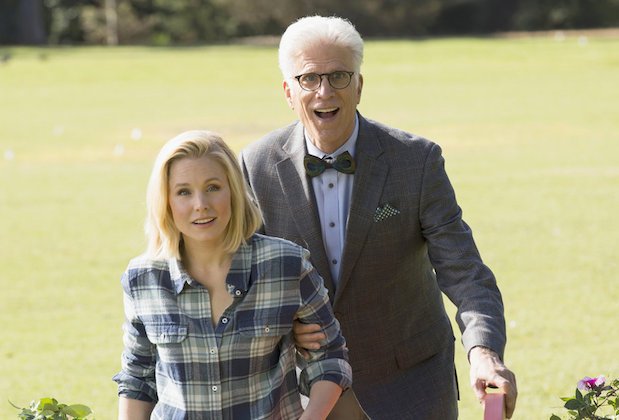(Full disclosure: I work for E! News, a subsidiary of NBC Universal, which produces and airs The Good Place. This review is entirely my own opinion, and is not in any way reflective of NBC Universal. I do not believe that my opinion was swayed by my employment, and I have written plenty of pieces that are critical of NBC Universal content, but if you want to take my review with a grain of salt, feel free!)
It doesn’t take much to sell me on a Michael Schur series. After spending a few years writing for The Office, Schur moved on to create Parks and Recreation, a modern classic, and Brooklyn 9-9, one of the most consistently funny sitcoms currently running. So even without the presence of the terrific Kristen Bell and sitcom legend Ted Danson, or the directorial hand of the great Drew Goddard, or guidance from television auteur Damon Lindelof, The Good Place was worth my time and attention. Considering that it ALSO involves all of the above, The Good Place was at the top of my “new shows to watch” list.
Even outside of its pedigree, The Good Place deserves recognition for trying something different. Schur has shown that even when he falls back on the formats and character-types with which he’s familiar, as he did with Brooklyn 9-9, his output is levels above most of his contemporaries. But The Good Place takes on bold ideas and touchy subjects, tackling them in the form of a serialized half-hour comedy on network television. That’s not just rare, it flat-out doesn’t exist in modern television.
And yet, despite following completely in its own footsteps, the immense amount of talent behind The Good Place makes it work. The premise, despite its complications, is easy to explain. When people die, there is a “good place” and a “bad place” (not specifically heaven or hell). Every good or bad action that somebody performs throughout their life nets them a number of positive or negative “points,” the balance of which decides where they go when they die. It is quickly apparent that our lead character, Kristen Bell’s Eleanor, is not the person that Good Place overseer Michael (Ted Danson) believes her to be, and there’s no way that the point tally for her actions on Earth actually earned her a place in her new neighborhood. And so, Eleanor tries to become a better person so that she isn’t discovered and booted to the Bad Place.
On it’s face, this is a rather by-the-numbers set-up for a sitcom: a character is trying to become a better person, and week by week they encounter new trials that test their character and allow them to improve. So far, The Good Place doesn’t stray too far from its obvious premise. However, what makes The Good Place smarter than your average comedy is in the details. The show regularly name drops famous philosophers and takes interest in what makes somebody a good or bad person: whether it lies entirely with their action, or in their nature, or whether a bad person can reform themselves into somebody good.
The Good Place also borrows heavily from Lost in the way it structures its storytelling and reveals its characters. Like Lost, each episode features character flashbacks. So far these have primarily exposed us to Eleanor’s time on Earth, but episode four featured a different character and I don’t doubt that future episodes will follow suit. This strucure allows The Good Place to balance its more serialized plot threads with episodic ones, keeping the show entertaining on a week-to-week basis while still hooking audiences for the long game. It’s too early for the formula to have begun to stagnate, but Schur has already shown a desire to upset the status quo, with a reveal at the end of season 3 that may be a hint that things are not as they seem in the Good Place.
It remains to be seen how well The Good Place will fare as it runs through its first set of episodes, but there’s huge amounts of promise here. The concept is original, Schur has proven himself to be a dependably great showrunner, and there are already hints that the series can balance its loftier, serialized ambitions with something more palatable to a network audience. Here’s hoping that audiences keep with it.
